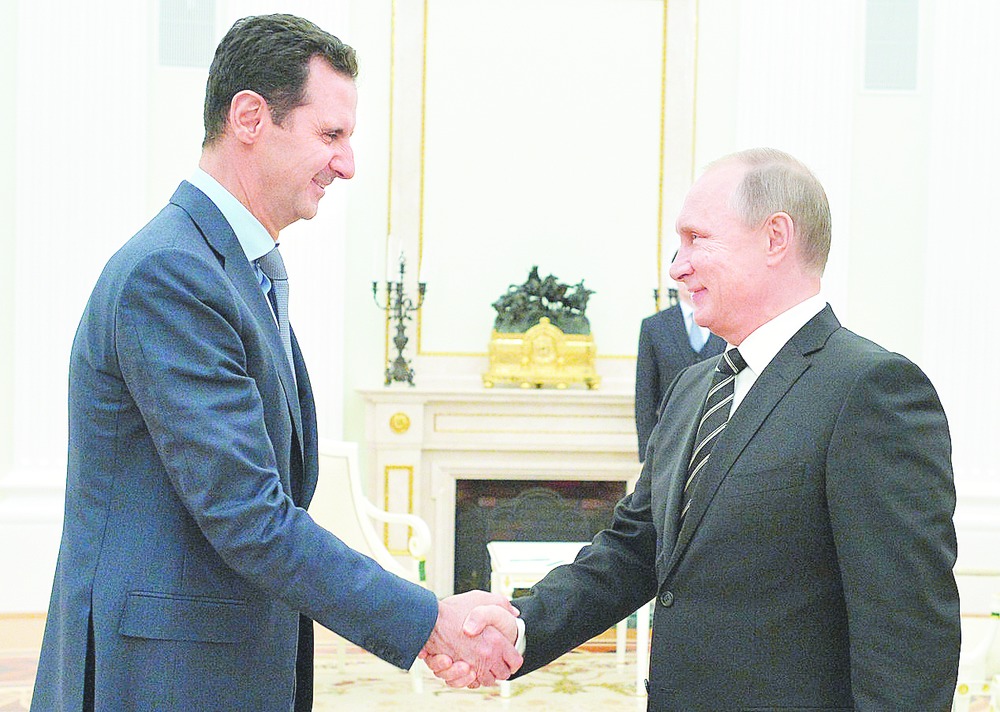
Moscow, Oct. 21: President Vladimir V. Putin of Russia called his counterpart, Bashar al-Assad of Syria, to Moscow for an unannounced visit to discuss their joint military campaign and a future political transition in Syria, the Kremlin announced on Wednesday.
According to a transcript posted on the Kremlin's website, Putin told the Syrian leader during the meeting on late Tuesday that Russia was ready to contribute to the fight against terrorism and to a political settlement of the conflict that has raged for more than four years. Assad, in turn, briefed the Russian leader about the situation on the ground and on next steps.
The surprise visit - evidently Assad's first outside Syria since the civil war began there in 2011 - highlighted how the political and military horizon of the long war of attrition has shifted drastically because of Russia's intervention.
"On the question of a settlement in Syria, our position is that positive results in military operations will lay the basis for then working out a long-term settlement, based on a political process that involves all political forces, ethnic and religious groups," Putin said. "Ultimately, it is the Syrian people alone who must have the deciding voice here."
In his response, Assad said that Russian intervention had halted the spread of terrorism and that a political transition could come after that threat was addressed.
"If it were not for your actions and decisions, the terrorism that is spreading through the region now would have made even greater gains and spread to even wider territories," Assad said, according to the Kremlin transcript.
"We all know that any military action must be followed by political steps," Assad said, calling the threat from terrorism a "real barrier" to any political settlement.
A summary of the discussion, also carried by the official Syrian news agency, said Assad demanded that the US and regional players like Saudi Arabia, Turkey and Qatar should halt support for his opponents.
"Of course, the whole nation wants to participate in deciding the destiny of their state, not only the ruling party," Assad said.
Dmitry S. Peskov, the Kremlin spokesperson, would not comment on whether the two men broached the topic of Assad's future during the talks, which Peskov described as "lengthy".
The most obvious focus of the talks was "the fight against terrorist and extremist groups, issues of the continuation of the Russian operation supporting the offensive of the Syrian military", Peskov said.
Just a day earlier, Turkey, one of Assad's most implacable critics, said it would accept the Syrian leader's staying in office for the first six months of a political transition, although its prime minister, Ahmet Davutoglu, told reporters on Wednesday that Turkey's insistence that Assad must go had not changed.
The US and its regional allies, as well as central factions of the opposition in exile, reject the idea of a significant role for Assad in any transition. Those differences have stymied international efforts to negotiate a political settlement.
The meeting was another chance to emphasise Russia's re-emergence as a crucial player in the Middle East. Part of the inspiration for Russian interference in Syria was to break out of the isolation imposed on Moscow over the crisis in Ukraine.
In the remarks published on the Kremlin website, Putin highlighted the fact that he was the one who called the meeting and that Russia wanted to be involved in the military and political goals.
"Despite the dramatic situation in your country, you have responded to our request and come here to Russia, and we thank you for this," Putin said.
He added, "We are ready to make our contribution not only to the military operations and the fight against terrorism, but also to the political process."
The lack of a response from Washington to Russia's initiatives on Syria has been a disappointment to the Kremlin, and the meeting with Assad will put new pressure on the Obama administration to engage.
Assad has not made any public visits abroad since the uprising began in March 2011, with diplomats long speculating that, if he left, those around him might overthrow him. But the new Russian support, including this high-profile meeting in Moscow, has clearly given him extra clout and a new political lease on life.
New York Times News Service










